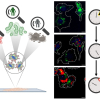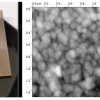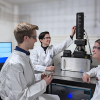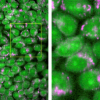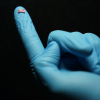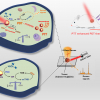
Professor Yang Liangbao, from the Institute of Health and Medical Technology, Hefei Institutes of Physical Science (HFIPS), has developed a general surface-enhanced Raman spectroscopy (SERS) method for actively capturing target molecules in small gaps based on a nano-capillary pumping model. In this research, using the principle of capillary suction, they constructed a nanocapillary pumping model, for the first time, with abundant hot spots, leading to the first systematic study of small gaps to actively capture molecules.
“What makes this method stand out is the highly universal characteristic of it”, said Yang. It could be used for highly sensitive detection of almost all types of molecules, including plasticisers, organic contaminants, anti-tumour drugs, poisons, toxins, pesticide residues, dyes, antibiotics, explosives and amino acids. This general method has provided a new way for stimulating active transport of target molecules to optimal hot spots to achieve ultrasensitive detection and real-time monitoring of cell behaviour or chemical kinetics.








